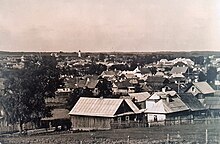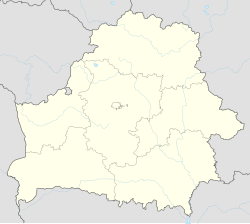Vilyeyka
Vilyeyka
| |
|---|---|
 Church of the Exaltation of the Holy Cross | |
| Coordinates: 54°29′50″N 26°54′40″E / 54.49722°N 26.91111°E | |
| Country | Belarus |
| Region | Minsk Region |
| District | Vilyeyka District |
| Elevation | 183 m (600 ft) |
| Population (2024)[1] | |
| • Total | 26,625 |
| Time zone | UTC+3 (MSK) |
| Postal code | 222410 |
| Area code | +375 1771 |
| License plate | 5 |
| Website | Official website |
Vilyeyka (Belarusian: Вілейка, romanized: Viliejka,[a] [vʲiˈlʲɛjka]; Russian: Вилейка, romanized: Vileyka) is a town in Minsk Region, Belarus.[1] It serves as the administrative center of Vilyeyka District.[1] It is located on the Viliya River, 100 kilometres (62 mi) northwest of Minsk. The first historical record dates from 16 November 1460. As of 2024, the town has a population of 26,625.[1]
The Vilyeyka VLF transmitter operated by the Russian Navy is located near Vilyeyka. It provides VLF communication between Russian Navy's headquarters and atomic submarines in the Atlantic, Indian and parts of the Pacific Ocean.
History
In the 10th–13th centuries, the territory was under the Principality of Polotsk, and in XIV–XVII under Grand Duchy of Lithuania as manor house Kurenets. The city was first mentioned in 1460 as a borough center of the Vilyeyka Starostwo of the Ashmyany county in Grand Duchy of Lithuania.
- 1635 – Władysław IV Vasa bestowed Vilyeyka upon Aleksander Korwin Gosiewski "for exclusive service to the state".
- 1765 – Vilyeyka has 30 houses, 165 inhabitants, and became a county center.
- 1793 – during the Second Partition of Poland the town is ceded to the Russian Empire.
- 1795 – under the decree of Catherine II of Russia the town receives the status of a city and becomes a center of Vilyeyka uyezd in Minsk Governorate, then Vilna Governorate (1842–1917).
- 1810, May 24 – almost the entire city is destroyed by the fire.
- 1861 – 2931 inhabitants, 1880 – 3450, by the end of 19th century – more than 3500 inhabitants.
- 1906 – big sawmill started.
- 1907 – the city acquires a branch of Warsaw – Saint Petersburg Railway and a city station.
- 1915, September 14 – occupied by the German Army, but several days later recovered by the Russian Army during the Sventiany Offensive.
- 1917, November 8 – Soviets come to power during the October Revolution
- 1918, December – occupied by German Army

- 1919 – ceded to Poland in the Peace of Riga following Polish–Soviet War, becoming the center of the Wilejka county in the Wilno Voivodeship (1923–1939)
- 1939 – annexed back to Soviet Union during the Soviet invasion of Poland in accordance with the conditions of the Molotov–Ribbentrop Pact. Becomes center of the Vileyka Voblast of BSSR
- 1941, June 24-25 – following the German invasion of the USSR over 1,000 inmates from Vilyeyka prison were forcibly marched eastward towards Barysaw. During the march, an estimated 500 to 800 prisoners died at the hands of guards.[2]
- 1941, June 25 – occupied by troops of the German Army Group Centre during the first stage of Operation Barbarossa and placed under the administration of the Generalbezirk Weißruthenien of Reichskommissariat Ostland. Over 15,000 civilians massacred including 6,972 Polish Jews.[3] See also: Belarusian Home Defence (BKA) pacification actions
- 1941, July 12 and 30 – German SS forces murder the remaining Jewish citizens in Vilyeyka (over 500 people).[3]
- 1944, July 2 – Vilyeyka recaptured by troops of the 3rd Belorussian Front of the Red Army during the Minsk Offensive.
- 1944 – the center of the Vileyka Raion formed
- 1954 – furniture plant started
- 1959 – repair plant opened
- 1973 – "Zenit-BelOMO"[4] optical plant started
- 1973 – Vilyeyka reservoir started
- 1994 – Vilyeyka voted for Zianon Pazniak in the 1994 Belarusian presidential election
- 1998 – Vilyeyka hydropower station started
Geography
The modern city is located on the right bank of the river Viliya, in the northwest part of the Minsk region, 100 kilometers from Minsk. The town's population numbers 30,000 people. There is a railway station of the Maladzyechna–Polotsk line in the city. The roads to Maladzyechna, Smarhon, Myadzel, Dokshytsy, Plyeshchanitsy run through the city. The town's industry is represented by the Zenit plant, wood processing enterprises (including a furniture factory), a motor repair plant, building materials plants, light and food enterprises. Vilyeyka also houses the Museum of Regional Studies.
The territory of the Vilyeyka district is 2,400 square kilometres (930 sq mi). Forests account for 41% of the territory. The main part of the district is situated within the borders of Narach-Vilyeyka lowland. In the year 1974, near the town of Vilyeyka Belarus's largest artificial reservoir was built — Vilyeyka reservoir with a total area of 63.3 km2 (24.4 sq mi) and a volume of 238 million cubic metres (8.4×109 cu ft).
Demography
Graphs are unavailable due to technical issues. There is more info on Phabricator and on MediaWiki.org. |
|
| |||||||||||||||||||||||||||||||||||||||
| Source: [5][6][7][8][9][10][11][12][13] | ||||||||||||||||||||||||||||||||||||||||
According to the 1921 census, the town's population was 62.8% Polish, 27.4% Belarusian and 8.1% Jewish.[6]
International relations
Twin towns — Sister cities
Vilyeyka is twinned with:
 Mozhaysk, Russia
Mozhaysk, Russia Pereiaslav, Ukraine
Pereiaslav, Ukraine Willmar, Minnesota, United States
Willmar, Minnesota, United States
Notes
References
- ^ a b c d "Численность населения на 1 января 2024 г. и среднегодовая численность населения за 2023 год по Республике Беларусь в разрезе областей, районов, городов, поселков городского типа". belsat.gov.by. Archived from the original on 2 April 2024. Retrieved 9 April 2024.
- ^ Mikoda, Janina, ed. (1997). Zbrodnicza ewakuacja więzień i aresztów NKWD na Kresach Wschodnich II Rzeczypospolitej w czerwcu – lipcu 1941 roku. Materiały z sesji naukowej w 55. rocznicę ewakuacji więźniów NKWD w głąb ZSRR, Łódź 10 czerwca 1996 r. [Criminal evacuation of NKVD prisons and detention centers in the Eastern Borderlands of the Second Polish Republic in June-July 1941. Materials from the scientific session on the 55th anniversary of the evacuation of NKVD prisoners deep into the USSR, Łódź, June 10, 1996] (in Polish). Warszawa: Główna Komisja Badania Zbrodni przeciwko Narodowi Polskiemu – Instytut Pamięci Narodowej. p. 76, 95–98. ISBN 83-903356-6-2.
- ^ a b Dr. Smilovitsky, Vileika (Polish: Wilejka) JewishGen, Yizkor Book Project. From materials of the Extraordinary Commission.
- ^ Zenit-BelOMO, zenit-belomo.by
- ^ Беларуская Савецкая Энцыклапедыя: у 12 т. / гал. рэд. П. У. Броўка. — Т. 12: БССР. — Мн.: Беларуская Савецкая Энцыклапедыя, 1975. — С. 697.
- ^ a b Skorowidz miejscowości Rzeczypospolitej Polskiej. Tom VII. Część II (in Polish). Warszawa: Główny Urząd Statystyczny. 1923. p. 78.
- ^ Drugi Powszechny Spis Ludności z dnia 9 grudnia 1931 r: alfabetyczny wykaz miast w Polsce w granicach administracyjnych z dn. 1.V.1933 r: wyniki tymczasowe Archived 2020-09-18 at the Wayback Machine. — Warszawa: Główny Urząd Statystyczny, 1933. — S. 1–5.
- ^ "Всесоюзная перепись населения 1970 г. Численность городского населения союзных республик (кроме РСФСР), их территориальных единиц, городских поселений и городских районов по полу". Демоскоп Weekly. Archived from the original on 2011-03-09. Retrieved 2019-02-06.
- ^ "Всесоюзная перепись населения 1979 г. Численность городского населения союзных республик (кроме РСФСР), их территориальных единиц, городских поселений и городских районов по полу". Демоскоп Weekly. Archived from the original on 2012-05-21. Retrieved 2019-02-06.
- ^ "Всесоюзная перепись населения 1989 г. Численность городского населения союзных республик, их территориальных единиц, городских поселений и городских районов по полу". Демоскоп Weekly. Archived from the original on 2006-10-21. Retrieved 2019-02-06.
- ^ Минская область в цифрах. — Мінск: Национальный статистический комитет Республики Беларусь, 2018. — С. 45–48.
- ^ Минская область в цифрах. — Мінск: Национальный статистический комитет Республики Беларусь, 2013. — С. 44–48.
- ^ "Численность населения на 1 января 2023 г. и среднегодовая численность населения за 2022 год по Республике Беларусь в разрезе областей, районов, городов, поселков городского типа". belsat.gov.by. Archived from the original on 17 April 2023. Retrieved 14 August 2023.




